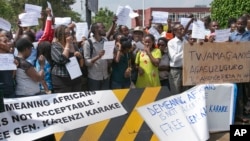Thousands of Rwandans protested outside the British embassy in Kigali on Thursday against Britain's arrest of Rwanda's intelligence chief, hours before he was due to appear court in London over war crimes charges brought by Spain.
Rwanda's government has said it was an "outrage" to detain Karenzi Karake, 54, director general of Rwanda's National Intelligence and Security Services, at Spain's request and that it will challenge the charges against him.
Western nations, Rwanda says, were swayed by those behind the 1994 genocide in which 800,000 people were killed, mostly minority Tutsis as well as moderates from the Hutu majority.
The country has long accused the West of doing too little to halt the genocide and then not doing more about groups such as the FDLR, a Hutu militia implicated in the killings and blamed by the United Nations and rights groups for atrocities in Congo.
"Africa say No to Western neo-colonialism justice," read one placard held up by protesters. "Stop confusing the world on genocide," said another.
Some of those at the rally were schoolchildren. One 17-year-old said he had been told to attend.
"When I reached the school in the morning, the head teacher called us when we were in class and at assembly, he told us to come to protest," he told Reuters. "I didn't know Karake but I came to know about him today."
Rwandan news websites showed images of protests in the north and eastern regions of the small African country.
Protests were also held on Wednesday outside the embassy, blocking the road to traffic.
The case may further strain ties between Rwanda and aid-donor Britain after Kigali suspended a local BBC radio service last year following a documentary by the British broadcaster that questioned official accounts of the genocide.
The British government has said Karake's arrest was a legal obligation based on a valid European arrest warrant. It has said it wants to maintain close ties with Rwanda.
"There are currently crowds of protesters around the British High Commission in Kigali. You should remain vigilant if you are in the area," Britain's Foreign Ministry said in an advisory to its citizens.
In 2008, a Spanish High Court judge, Fernando Andreu, accused 40 Rwandan military and political leaders, including Karake, of engaging in reprisal killings after the genocide.
The judge indicted the officials for genocide, crimes against humanity and terrorism that resulted in the deaths of hundreds of thousands of





